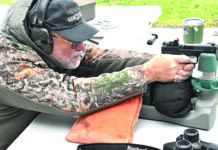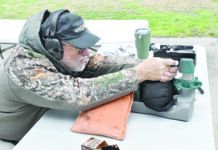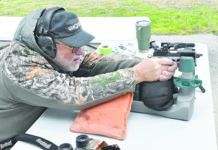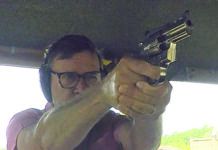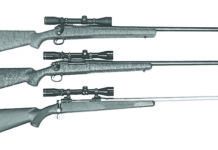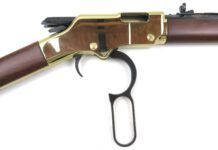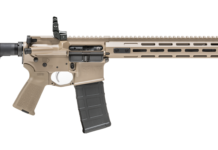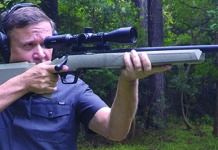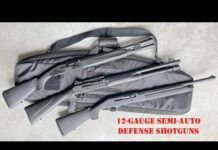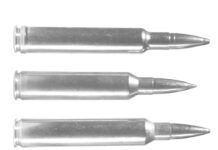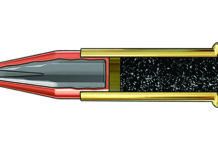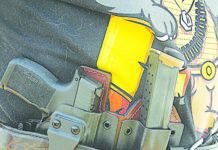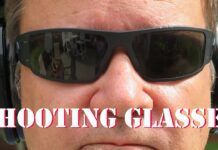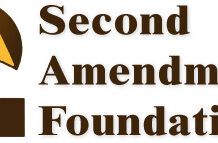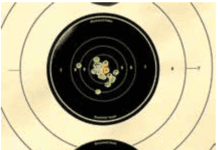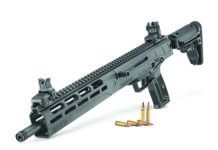City Tries to Shoot Self in Foot
With Anti-Gun Proposal
Columbus, Ohio, City Councilman Michael C. Mentel has proposed banning further sales of semiautomatic firearms and giving people who bought semiautomatic firearms before the ban 90 days to register them. The city has tried twice before to ban different classes of guns, but has been rebuffed both times by the courts. If such a ban passes again, it could affect whether the annual convention is held in the city in two years.
The courts overturned similar bans in the 1990s. In 1994, a federal court overturned Columbus 1989 ordinance, ruling the citys attempt to ban 46 makes and models was unconstitutionally vague. Columbus passed another ban in 1994, but a federal court shot that down because it didnt properly define an assault weapon by its general characteristics.
The new Columbus proposal defines an assault weapon as a semiautomatic rifle with a detachable magazine with any of these five components: a protruding pistol grip, a grip for the nonshooting hand, a thumbhole stock, a shroud covering a hot barrel and a muzzle brake to reduce recoil.
Last month, the National Rifle Association announced it would hold its 2007 convention May 18-20 in Columbus, an event expected to draw 60,000 to the Greater Columbus Convention Center.
Asked if the proposal would prompt the group to relocate to another city, NRA spokeswoman Kelly Hobbs said, All options are on the table. We would have to consider that.
Well certainly come out with a more official position if and when its passed.Experience Columbus, the areas convention and visitors bureau, expects the convention would bring $12 million to $15 million into the citys economy.
Our Take: The NRA is welcome to come back to Houston again in 2007 if Mentels measure passes.
———-
Families Afield: Program Seeks
To Improve Young-Hunter Recruitment
Always wanted to get your kid into hunting and shooting, but couldnt because your state says its illegal? Three groups are working to make the introduction to hunting easier.
The U.S. Sportsmens Alliance, the National Wild Turkey Federation, and the National Shooting Sports Foundation have created an education and lobbying program called Families Afield. The programs aim is to make the introduction to hunting easier in states that impose legal restrictions on the activity.
Doug Painter, president of NSSF, said, Hunting is revered in our countrys character and economy. We shouldnt allow age restrictions to compromise its future.
Many hunters want to go afield with their daughters and sons, but doing so would constitute a criminal act in many locales – 20 states have laws prohibiting youngsters from hunting with their parents. Mandatory prerequisite coursework and certification processes add more red tape that prevents the introduction of hunting.
Over time, declining participation will devastate hunting, and substantially shrink the market for gun sales. Over the past quarter-century, the total number of hunters has dropped 23 percent.
To improve hunter recruitment, Families Afield will attempt to persuade leaders to re-examine their states restrictions on hunting. States will be selected on need, opportune climate and available resources, including volunteer manpower and budget.
There are 30 states with youth- and family-friendly hunting laws, 16 of which have no restrictions on youngsters. Data show these 16 states are leading the way in hunter recruitment.
Other states are recognized as being very restrictive. These states prohibit introducing youth to all or most hunting, particularly for big game, until age 12 or later. Also, in most cases, youngsters may not experience hunting until theyve met hunter-education requirements.
Somewhat restrictive states prohibit introducing youth to all or most hunting, particularly for big game, until theyve met hunter-education requirements.
Our Take: If these trends arent slowed or reversed, the broader market for guns and shooting of all types will be curtailed. Many current gun owners got their introduction to shooting through the field sports. They may no longer hunt, but had they not started with hunting, their interest in gun ownership might never have developed.
To find out how you can help the Families Afield in your state, contact the USSA at (614) 888-4868; the NWTF at (800) THE-NWTF; or the NSSF at (203) 426-1320.
Also With This Brief
“State Hunting Restrictions”
“Sports Injuries”
———-
Legislation Roundup
• National: By a 278-149 vote, the House killed an amendment by Rep. James Moran to block .50-caliber exports to civilians. Voters in the majority said the government already has ample authority to block the export of .50-caliber weapons. The NRA said the amendment was an unnecessary infringement on gun rights and that existing laws provide penalties for smuggling the rifles.
• California: Several anti-gun bills were slated to be read in late June. Senate Bill 357 requires that all handgun ammunition carry a unique serial number engraved on both the bullet and the case and be registered to the purchaser. SB 357 bans the manufacture, transfer, and possession of non-serialized handgun ammunition after July 1, 2009, and possession of non-serialized ammunition would be a crime. SB 357 would also require ammunition vendors and manufacturers to register with the Department of Justice. Assembly Bill 352 expands the definition of unsafe handguns to include semi-automatic pistols that are not designed and equipped with an array of microscopic characters which identify the make, model, and serial number of the pistol by imprinting the characters on each cartridge case when the firearm is discharged. Assembly Bill 996 would require all retailers to display and sell ammunition in a manner that is only accessible by an employee, not the purchaser.
• Pennsylvania: The states hunters cant praise the Lord and pass the ammunition on Sunday because a hunting prohibition dating back to 1873 still applies. But House Bill 904 would allow expanded hunting on Sundays by simply repealing a section of existing law. Some 38 states allow unlimited Sunday hunting, and a few others allow it for limited periods. The Pennsylvania Game Commission does not oppose the bill, although its board is split over the issue.
• Texas: Governor Rick Perry has signed several bills seeking to refine existing gun laws, all of which the NRA supported.
House Bill 225 extends the renewal period for a concealed handgun license from four to five years without an increase renewal fee. House Bill 322 reduces all fees for a concealed handgun license for military members by 50 percent and lowers the age from 21 to 18 for members of the military to obtain a concealed handgun license. House Bill 685 exempts military members and veterans from taking the range portion of the concealed handgun process if they had been weapons certified in the military within the past five years prior to application for the license. House Bill 1483 expands methods by which applicants for a concealed handgun license may pay the fees to include check, cash, and credit card. Currently, only cashiers checks and money orders are accepted. House Bill 823 clarifies the current definition of traveling as it relates to someone carrying a firearm. Current law is ambiguous and is interpreted differently by courts and law enforcement. House Bill 1038 reduces the fee for renewal of a concealed handgun permit for senior citizens by 50 percent. House Bill 1066 increases the number of states eligible for reciprocity with Texas. Senate Bill 734 allows hunters on private land annexed by a municipality.
• Wisconsin: Under a bill scheduled to be introduced in July, private companies and law enforcement organizations would issue carry permits instead of county sheriffs. In late 2003, a measure allowing concealed weapons passed both houses of the Legislature, but Democratic Gov. Jim Doyle vetoed it. In early 2004, the Senate voted to override the governor, but the Assembly fell one vote short of doing so, allowing Doyles veto to stand. A new version of that bill would give the responsibility of issuing permits to another group, such as the state Department of Justice, the Fraternal Order of Police, the Law Enforcement Alliance of America, or private security firms. Permits under the new bill would cost $75, compared with the $113 in the last bill.
Also With This Brief
“I’d Sooner See Crime Stats Fall”
———-
When In Doubt, Educate Them
A Utah state legislator, Republican Rep. Curtis Oda, is setting up free concealed weapon classes for policy-makers and their families this summer.
Oda, a Republican House of Representatives member from Clearfield, said, I think its very important they learn the truth. What it boils down to is theyll learn the truth, then when something comes up, at least theyll be talking from the standpoint of knowledge, not emotional ignorance. If they still dont agree with it, thats fine.
Twenty-five legislators were said to be interested in the classes, most of which were scheduled for July. The first two students were Gov. Jon Huntsman Jr. and Lt. Gov. Gary Herbert. The future governor and lieutenant governor took the four-hour training and received their permits.
Oda, long an advocate of gun education, and James D. Mitch Vilos, an attorney from Centerville, have taught several classes and have more planned.
Lt. Gov. Herbert declined to say whether he carries concealed. The governor has armed guards with him 24 hours a day, while Herbert does not. Herbert and his assistant were assaulted last summer on the campaign trail in Tooele.
Herbert said, Id just as soon not have the public know whether I carry a gun or not.
Our Take: Rep. Odas purpose in arranging the free classes is to increase the level of support for concealed carry permits in Utahs Capitol. It seems like a direct, effective way to educate lawmakers about gun rights.


